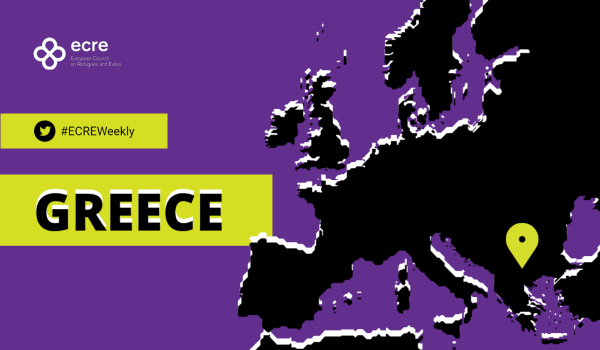The European Commission have issued several letters of notice to Greece over failure to comply with EU law including in relation to reception and detention of asylum seekers and refugees. Refugee Support Aegean (RSA) and ECRE member, HIAS Greece urge a “stronger and more transparent” oversight on compliance with EU asylum standards on the Greek islands. A joint submission from civil society organisations reveals “backsliding” of the rule of law in Greece. New report points to systematic pushbacks and confirms the prevention of entry for more than 230,000 people between January and October 2022.
The package of infringement decisions released in January reveals that the European Commission has issued several letters of formal notice to Greece for failing to comply with obligations under EU law. Two of the letters issued relate to the reception conditions of asylum seekers and the qualification for international protection. “It’s a welcome step to see that the Commission is finally upholding its role as Guardian of the Treaties by taking action to hold Greece accountable for its human rights violations against refugees and asylum seekers. For years, we have seen how Greece’s deterrence policy results in people’s lives being put on hold in EU-funded ‘prison-like’ centers and unable to access the asylum system. But words on paper are not enough. We now expect concrete results from the EU and Greek authorities to end these rights violations,” Oxfam EU migration expert, Stephanie Pope stated in response. According to the Greek outlet Efsyn one letter concerns discriminatory criteria excluding recognised refugees from most social benefits in Greece. The other relates to the arbitrary detention of asylum seekers during screening procedures, dubbed in law as “restriction on freedom” inside Reception and Identification Centres on the islands, the land border and two mainland locations. According to Minos Mouzourakis from RSA: “Blanket de facto detention” during screening is a “Chronic issue”. Mouzourakis further notes: “Infringement proceedings take time but signal what civil society has been calling for: EU rules must be implemented & Greece, as any country, must maintain a functioning asylum system”.
RSA and HIAS Greece are urging a “Stronger and more transparent oversight needed from the European Commission on compliance with EU asylum standards on the Greek islands”. In a joint submission to the European Ombudsman, the organisations highlight: “a lack of clarity and transparency on the functioning of the Task Force Migration Management set up by the European Commission in September 2020, in their contribution to a targeted consultation launched by the European Ombudsman under an inquiry on how the Commission ensures human rights compliance in new EU-funded reception facilities on the Greek islands”. The organisations also raise concern over: “the monitoring of implementation of the Memorandum of Understanding signed by the EU and Greece in December 2020 as part of a plan for a new Multi-Purpose Reception and Identification Centre (MPRIC) on the island of Lesvos, since many of the targets set therein have not been met two years later. Task Force meetings with authorities under a dedicated Steering Committee have stopped since April 2022, while no records seem to be kept of meetings with civil society organisations”.
The organisations Vouliwatch, Refugee Support Aegean (RSA), Generation 2. 0 (Second Generation / Institute for Rights, Equality, Diversity) Reporters United and ECRE members Greek Council for Refugees (GCR) and HIAS Greece have made a Joint Civil Society Submission to the European Commission on the 2023 Rule of Law Report. The submission highlights the continued “backsliding” of the rule of law including: “Unlawful push backs of refugees and migrants, Non-compliance with interim measures indicated by the European Court of Human Rights, Targeting of NGOs and human rights defenders, Impermissible barriers on the exercise of the legal profession, Ineffectiveness of judicial review of immigration detention, Concerns on the functioning of monitoring bodies – including the National Transparency Authority and the recently established Fundamental Rights Officer at the Ministry of Migration and Asylum”.
A report published in January by the Protecting Rights at Borders (PRAB) initiative that includes several ECRE members, reiterates some of the mounting evidence and critique of violations in Greece. “Pushbacks at land and sea borders have become de facto general policy’ notes the UN Special Rapporteur on the Human Rights of Migrants in a report issued in June 2022. From 1 January to 20 November 2022, UNHCR reported 12,787 third country nationals entering Greece by land and sea. The Greek Ministry of Migration and Asylum reported 9,116 arrivals recorded in Reception and Identification Centers (RICs) from April to September 2022. Significantly higher number of persons trying to reach protection and the territory of Greece, never managed to do so. Recent statistics provided by the Hellenic Police show that from January to October 2022, a total of 230,993 persons were prevented from entering Greek territory”, the report states. While such preventions have been confirmed by the Greek government it has offered no clarification of the procedures and continues to deny and deflect evidence of pushbacks.
For further information:
- ECRE, Greece: Conflicting Messaging by Government as Evros Border is Further Fortified and Pushbacks Continue, Syrian Refugees Increasingly Unsafe in Turkiye Deemed Safe by Greece, January 2023
- ECRE, Greece: Increase of Pushbacks with Impunity Amid Ongoing Crackdown on Solidarity, Türkiye Considered “Safe” by Greek Authorities Sets New Record of Deportations, Thousands of Vulnerable Refugees Left Without Adequate Accommodation After Closing of ESTIA Programme, January 2023
This article appeared in the ECRE Weekly Bulletin. You can subscribe to the Weekly Bulletin here.

